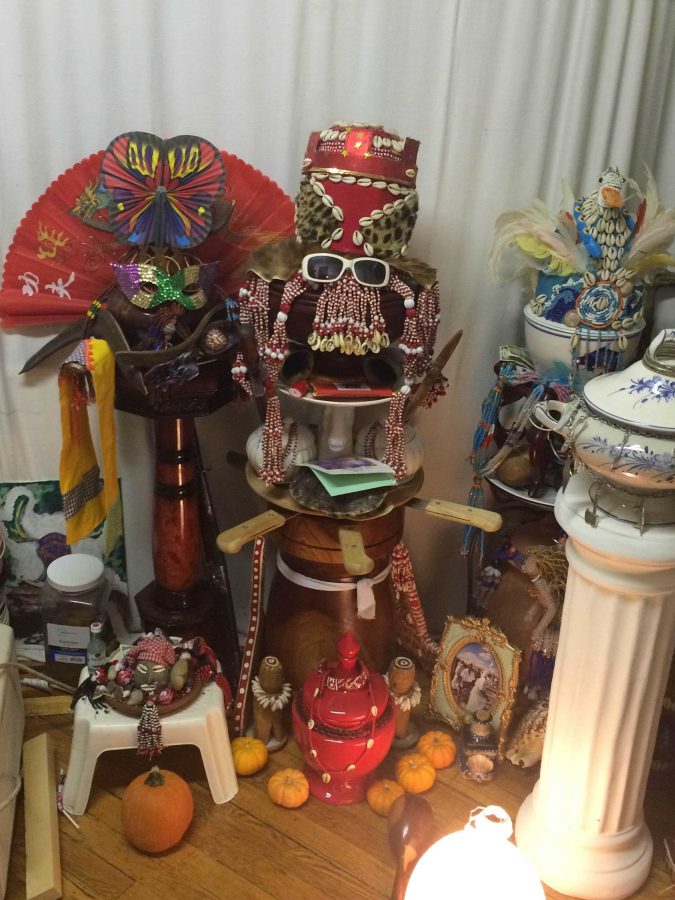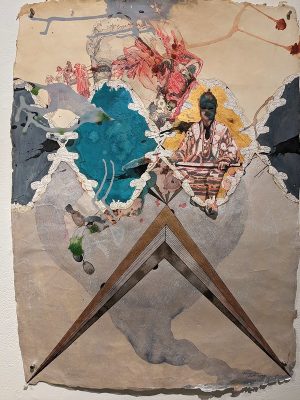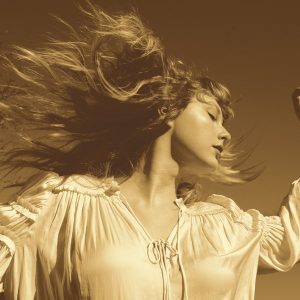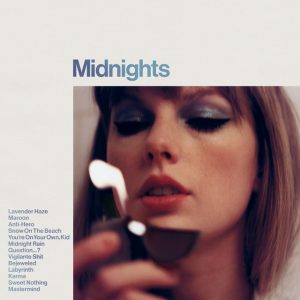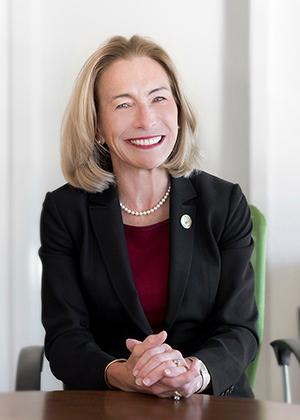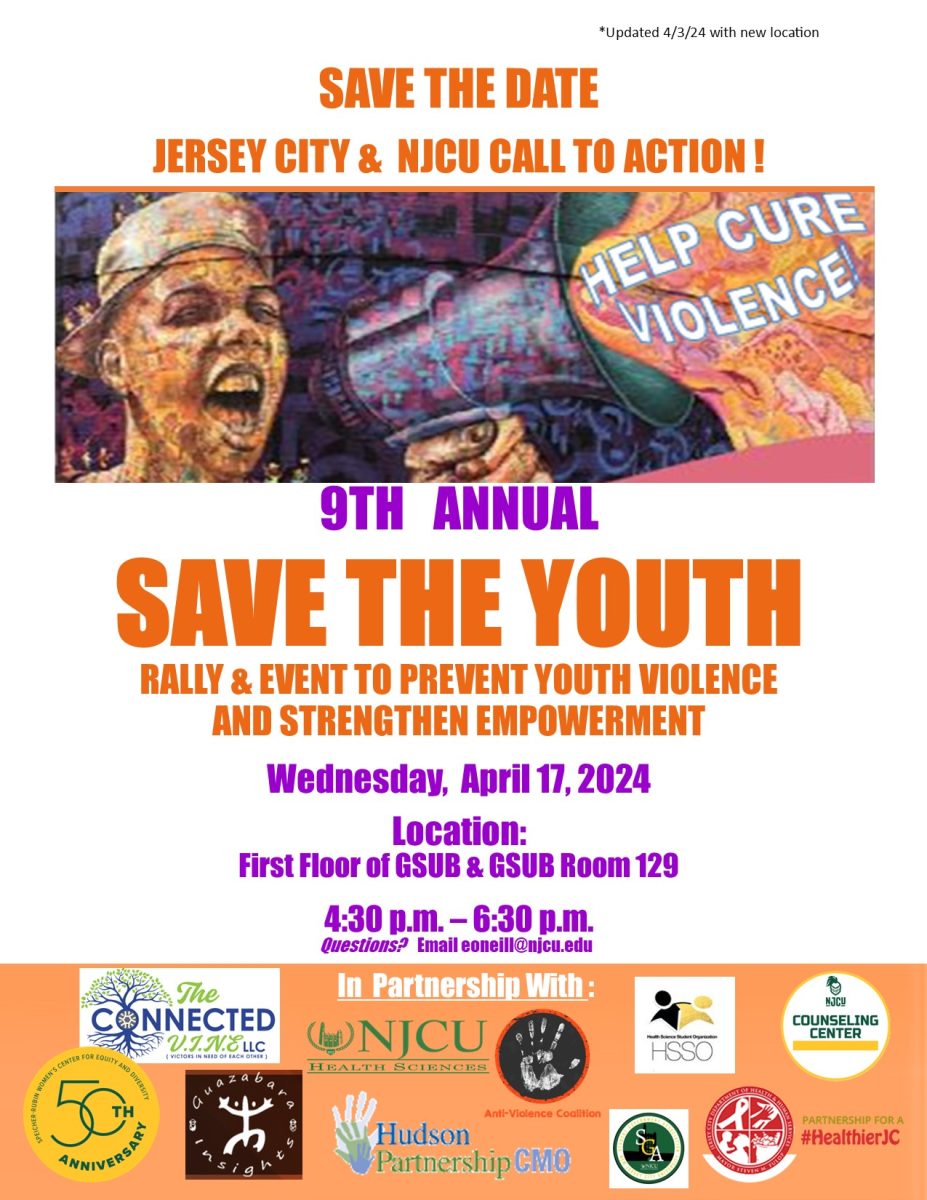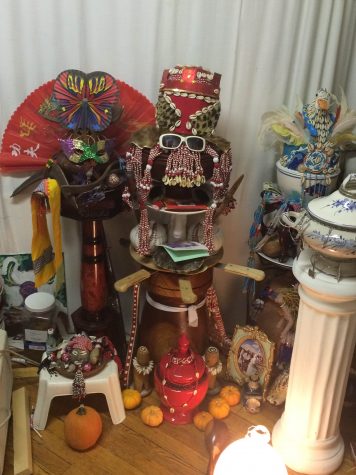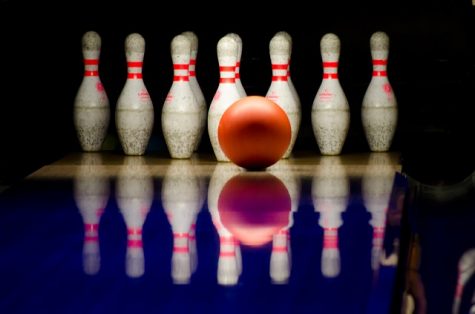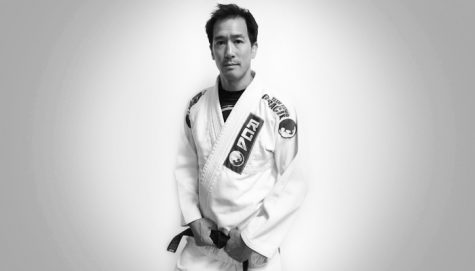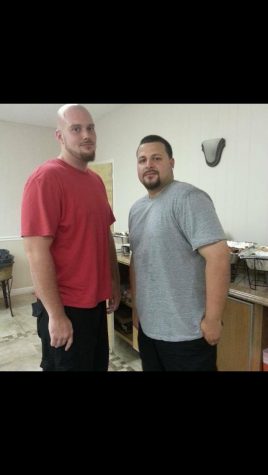Tales of an Underground Religion
Voudon
Voodoo Shrine in an Area Home
July 25, 2016
A dark man dressed in red and white religious garbs sat straight up in a chair with his head forward. His body, possessed by a spirit, while his face lacked emotion. Women followers, clothed in satin spiritual gowns and headscarves, danced and sang songs about “doing work” for the gods in Haitian Creole, as they patiently waited to kneel before him. One by one the women came up to the sitting man to perform a ritual handshake, saturate him with spiritual spray, and wipe his face with their matching mystical cloth.
The group of 150 men, women, and children were gathered under a semi open temple in Haiti, amassed around a pole, the center point of the voodoo ceremonies. Several men sitting in the rear of the room played drums and handmade horns manufactured with wood as a crew danced along swaying their hips to the rhythm as drummers released the beat of the universe unto them. Some people sat back and observed as spirits possessed the dancers, drummers, and the priest and as he drowned a bottle of liquor down a cow’s nostrils that was secured to a tree by his horns. On the center of the cow was a symbol of a Veve representing the Loa spirits; the pattern was also drawn on the floor of the temple with candles, a bottle of liquor, and a glass of water placed in the center to attract spirits.
Once all the women were greeted with the handshake (a gesture that transfers the deity from one body to another) Pierre began to focus on the cow, rubbing him vigorously before twisting his head until his body fell limp. He then began to hack at the calves’ neck with a machete until his head was severed completely from his body. Moments later a young pig was slaughtered and a black bird was beheaded, each animal’s body still moving as if filled with life after its death.
After draining the blood from the cow, Pierre drenched himself in the liquid, washing his face, hands, and arms thoroughly with the red fluid. Young infants were passed to the priest to be bathed from head-to-toe in a spiritual launder, courtesy of priest Pierre.
“The blood is for the gods. That’s what they require. Drinking the blood is a big sacrifice that is how the deity gets the strongest. When we rub blood all over the baby it is done to bless the baby and protect her so that nothing can happen to her,” said fifty-two year old storeowner and Voodoo Priest Pierre Val.
In the faintly lit basement of Val’s store, called Tous Les Anges Botanica, The 2015 Annual Haitian Voodoo celebration, hosted by Val, played on a small twenty-inch boxed television. Val’s store sits discreetly in the Bergen- Lafayette section of Jersey City, acting as the secret link for believers in the area looking for assistance from the spiritual world.
It is not uncommon for people to think of Christian, Islamic, or Judaic faiths when considering religions, particularly in the Unites States. Rarely, is Voodoo thought of as a real creed practiced in modern America, let alone in Northern New Jersey. In fact, for hundreds of years the religion has been viewed as an evil practice with people consecrating devilish spirits, voodoo dolls, and conjuring dark magic. Because the religion has no book to follow, the rules and practices for the dogma is left unfinished, open, and incorporative to other systems.
Haiti’s deep roots in Voodoo derive from the various African tribes that populated the country’s plantations. It is said that the whole of Africa contributed to the Haitian Voodoo tradition, making that particular sect one of the strongest outside of in Africa. Haiti’s traditional beliefs are influenced by Yoruba people (Nigeria), Kongo people (Bas-Zaire and Angola), and Fon people (Benin). While the Haitian system is based on healing, they are continuously changing the ideology throughout centuries to fight off political oppression.
“I practice voodoo to help others. Most people come to me because they lost their job or want an improvement in their family. The most important thing they come to me for is good luck,” said Val.
As the local Hungan (priest), Val sees about 3-4 people a day looking to regenerate some portion of their lives.
The Hungan (male priest) or Mambos (female priest) are the chosen people who are elected to receive divination from the deities. The priests have the ability to receive knowledge though the gods that possess the carcass. At times visions may appear while the priest or priestess is sleeping. The Hungan or Mambo act as the mediator for their clients, calling upon the Orishas for support in aiding problems in their clients lives. When the priest sacrifices an animal the act is done to restore power to Loa and to ask the spirit for relief in the physical world.
“We normally ask for one hundred dollars. But if someone has just lost their job I’m not going to take money from them, my spirit won’t let me do it,” said Val.
Val has owned and operated Tous Les Anges Botanica for the past ten years, seeing as many as twenty people on a busy Saturday. The store overflowing with religious statues, spiritual books, and cleansing soaps always appears deserted. There was no cash register in site, the statues were covered in dust and the religious booklets were so old that the colors on the front were fading. A door in the rear of the store conceals where the magic happens, in the basement of the store.
Chairs were lined against the staircase of the large four-room cellar. The ceiling was decorated in birthday party streamers and partly deflated balloons. Children played around while several women sat quietly waiting, uninterested in sharing their reason for visiting priest Val. A table full of old dusty dolls and liquor bottles was pushed against a wall. The room was full with boxes, bins, and clothes, the over packed appearance gave the crypt a crepuscular vibe. In the middle of the floor was a large bowl with nearly seventy-five dollars in cash.
Two quarters of the underground store was furnished with chairs for the customers waiting to ask the priest and his deity’s to resolve their problems. And one-by-one, Hugan Val, would take the customers into one of the private rooms with the handmade sign on the door indicating the price for the psychic reading.
Essentially, Voodoo is to the way of living for devotees because in the religion there is no belief of heaven or upward mobility. When priest request a favor from the gods it is normally done to remove miseries from their lives, not for joy or material possessions. Coexisting with the spirits means an easier or more hectic life for some.
“I’ve always had the spirit in my head since a young boy in Haiti. I know this because some of things I don’t have the knowledge to do by myself. The spirits give me knowledge that I did not get on my own,” said Val.
“The spirit works for 12 months, if all he did is coming true you give him a gift on November 3. Every year we hold the celebration for the deity’s, if we don’t something could happen,” stated Val.
Across the Hackensack River is another City with citizens active in the Voudon religion.
As an outsider walking the streets of Newark it would be nearly impossible to know the religious status of the residents. You would never know if your neighbor is conjuring up spells behind their doors unless you know them personally or have been inside their homes to bear witness to the unknown.
Yet, behind the closed doors of a blue two story home in the Weequachic section of Newark lives a family who practices what is known as Lucumi. The practice often goes by many names; Voudon is the original name for the practice popularly titled Voodoo. One of its religious sects is the more familiar Santeria an additional strand of Voodoo called Lucumi. The standard name is Santeria, meaning “the way of the saints,” was derived from the Afro-Cubans use of the word Santos to describe the orishas, outsiders labeled it Santeria.
“In 1968 my uncle went to the New Black Power conference in Philadelphia. He met a guy by the name Walter King also known as Oba Efuntola Oseijeman Adelabu Adefunmi, one of the first African Americans to convert into the Voudon religion in Cuba. He took my uncle to a reading in 1970; my uncle joined the religion and received his beads. Two weeks later my grandmother joined and got her beads. The religion has been apart of my family since,” said Oba Olff a 39 year old Lucumi priest from Newark.
Olff is a stocky guy who stands about five-foot eight inches in baggy clothes that appear too large for his frame. As Olff opens the door to the second floor apartment, his face revealed the most pleasant smile that would automatically put any stranger at ease. Inside the compact corridor of the apartment was an entry to five other rooms. In each doorway, there hung a circled dream catcher with feathers dangling from the bottom to ward off any negative dreams or thoughts. Olff walked into the first doorway on the right, directly past the dining room decorated with an old fashioned wooden table and books stacked to the ceiling in crates towards the diagonal chamber filled with religious paraphernalia. After scurrying to the back, he immediately fell down to his knees in front of the fixtures and began praising his gods as if he were alone.
The room was decorated with statues put together with found objects and pieces honoring the gods they represented. Pictures of dead family members, glasses of water, and religious beads were scattered around the small space dedicated to worshipping. Each figure in the chamber represented an Orisha who each contain distinct abilities, an endowment given by the supreme God. The Orishas are Olodumar’e children sent to maintain the earth, the following Orisha’s were present as fixtures in the small room dedicated to deities.
Elegba – known as the trickster, he is the most important of them all because he is the owner of the crossroads providing humans access into the divine world.
Oshun – the deity of fresh water, known for healing, love, and fertility. She is the oriesha mostly called for money issues because it is said she can accomplish almost anything.
Obba – the deity of marriage and personal transformations.
Oya – the deity of wind, strength of women, she is known to use a machete to scare away death. Is it believed that she the owner of the cemetery gates and watches over the dead to help them make the transition into their new world.
Shango – the king of kings, lord of light and thunder, and the controller of fire. He is also known as a womanizer, a warrior caring a double headed axe, and the master of dance.
Babalu Aye – the deity of sickness and healing. He is one of the most worshiped Orisha, fighting off contagious diseases.
Ogun – known as the blacksmith. He is the god of labor, iron, and war. Ogun is known as the father of technology and a powerful man carrying a machete and wearing a skirt.
Orisha Oko – the orisha of agriculture, he gives birth to the crops and life, procreation and fertility.
Yemaya – the mother of all living things and ruler over maternity. Life is said to have begun at sea with Yemaya, her name meaning “Mother whose children are the fish”.
The Lucumi religion stems from the Yoruba people of West Africa, it is the Yoruba word used for the Santeria religion and the Afro-Cuban practitioners worshipping of the Orishas. Santeria is the most commonly used name of the religion, but it is also known as Regla de Ocha, La Regla de Ifa, La regal Lucumi, or Lucumi. Santeria is a combination of beliefs from the Yoruba mythology and the Roman Catholic Church. The standard name, Santeria means “the way of the saints,” derived from the Afro-Cubans use of the word Santos to describe the orishas, outsiders labeled it Santeria.
“In 2005 I was ignited as a priest. The position is very demanding, asking a deity to be a part of your head. I can hear them and sometimes see them. I’ve had instances where I’ll be talking to someone and the deity’s are telling me devastating information that is getting ready to happen in the individual’s life” stated Olff.
Unlike the Haitian tradition, the priest and priestess in Lucumi are called babalorisha and iyalorisha. Babalorisha means father in the spirit and iyalorisha means wife or mother of in the spirit. The job of the priest as the head of the doctrine is the ability to initiation others, and the extension of family through godchildren to whom they can pass the spirits onto. They are also notorious for their knowledge of the detail of the ritual.
According to Olff there are four compartments in Lucimi that overlap which is spiritualism, strong Congo cults, the enlightenment stage, and the Ifa. The Ifa is not present in the Haitian or Brazilin practices.
Spirituality manifest through the path of knowledge (caino de Orula) and the path of the spirit (camino de santo), which advances a persons ability to understand the activity of the spirit in the physical world. The Camino de Orula is also known as the Orula or Orunmila, the Congo cult present at the creation of the universe, the start of every life, and had the capability to recognize fate. Orula is sometime referred to as Ifa, the master of the Ifa is babalawo meaning father of mystery. In order to become a master priest the babalawo must remember a multitude of Ifa’s poetry in the Lucumi language.
“It takes about a year long before a person can be initiation into Lucumi. The initiation is a seven day process where you have to wear all white and practice absence from sex for one year” says Olff.
It is said that Lucumi began to spread in the nineteenth century when a large amount of Africans from Yorubaland (Nigeria, Benin, and Togo) arrived in Cuba to work the sugar plantations, bringing along with them their deep religious beliefs. However, there were traces of African religion in the Caribbean prior to the nineteenth century due to slavery. Over two hundred thousand Yoruba speaking people known as Lucumi were transported to Cuba in the early eighteen hundreds which show that the religion may have existed in the area prior to the nineteenth century.
Before the slave trade the major cities in Yoruba land was the hub for worshipping different Orishas. The slave trade caused the Lucumi people to maintain their system of belief outside of their native soil, modifying the system to mix with Roman Catholics beliefs due to the Code Noir Laws banishing any religion other than the Catholic religion in the new world.
The attempt to prosecute the Voudon religion came in 1685 when the Code Noir Law was established, forbidding the practice of any religion other than Roman Catholicism in French colonies. Prior to Code Noir negros in the French Colony were not calculated as part of the population. French King Louis XIV’s passed the Code Noir law also known as the Black Code to gain order in the new French colonies, he set rules for the slaves and their masters to follow while solidifying the slave’s new legal status.
“The law restricted African slaves from partaking in the Voodoo tradition when Haiti was governed by Spain. The tradition went underground although people continued to pass on the teachings and rituals” said Reverend Robert Wister a church history professor at Seton Hall University. “Things written about the religion are biased. It’s typical of those countries; the British banned anything non-Protestantism. There were all sorts of religious oppression that slaves were able to maintain through language.”
Although many have lost ties with the African religion there are still some deep ties that the African American and Caribbean communities hold to the tradition unbeknownst.
“There is a tradition in the African American family requesting that you wipe your feet at the door. It is a West African gesture to salute the God Elegba – the deity that stands at the threshold of things,” said Olff.
In the spirit of voodoo there is no god or deity without human beings, Orishas exist only through the community. West Africans did not believe in the phrase “rest in peace” they believed that when ancestors die they moved on to do work for the communal.
“If you have spirituality then you understand that you are not duped into the power in the sky thinking that when you die you go to heaven and that’s it” said Olff.



